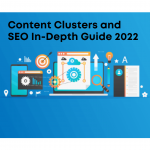Table of contents:
- Blog Summary
- Introduction
- What is Google’s Helpful Content Update?
- How does this update work?
- How to avoid its effects on your website?
- Why did Google launch this?
- Conclusion

Blog Summary
Did you hear about Google’s Helpful Content Update? If you are a digital marketing agency that provides content writing services, this is something you should definitely know. This blog will cover everything there is to know about the new update and how it will impact businesses worldwide.
Introduction
From a random question that popped up on your mind at 3 a.m. to a complicated physics concept, Google is where we go for answers. But imagine a scenario where you search for something on Google but can’t find the answer to it even after multiple attempts. Isn’t that frustrating? Google understands how this can affect user experience. This is the main reason why they came up with the new Helpful Content Update to provide users with useful and accurate information based on their searches.
The algorithm aims to increase the frequency of people-first content and decrease the amount of content that puts SEO rankings over useful content.
If you are a digital marketing agency or a businessperson with a website on the internet, knowing about this update is crucial for the success of your business. Read till the end of the blog to know how this update can impact your business and how you can avoid its effects.
What is Google’s Helpful Content Update?
Google launched the Helpful Content Update in the last week of August 2022 in an effort to provide its users with premium, top-quality, and useful content.
The primary focus of this update is to provide a better experience for both searchers and content creators on Google to create and find useful and informative content. Google intends to promote high-quality content that was written by people, for people. By implementing this new upgrade, Google will ensure that unoriginal, useless, and uninformative content does not rank highly on the SERP.
This implies that the website’s overall visibility in the SERPs may be hampered if the machine learning algorithm believes that a significant amount of content on a website is useless or of low quality. Naturally, websites with original and beneficial content are less likely to be impacted by this update.
How does this update work?
According to this update rolled out by Google, websites with good-quality content that give users a satisfying and smooth experience are more likely to rank high on search pages. Based on many factors like usefulness, search engine capability, and reliability, Google will easily and automatically recognize low-quality content on the web and take them down from SERPs.
And once your content has been removed from search pages, you need to win back Google’s trust (and rankings, of course) for your content to show up on the top again. You need to write better content that will convince the search engine that users who come across your content will surely benefit from it.
Once you publish your new content on the web, it will take up to one month for Google to identify and rank it. Google’s update classifier will scan the web pages to determine whether they are new or existing. If it turns out that there is no helpful content, in the long run, the classification will be dropped, and you have to try again with better content.
How to avoid its effects on your website?
One of the most important features of this update is that it is a site-wide update, which means that it affects your entire site and not just the SERP ranks or your URL rankings. Your whole website can be penalised if Google finds that you have unhelpful and low-value content. However, there is no information on the level of penalty or the percentage of poor-quality content allowed on the website.
Though Google has not mentioned a specific niche that will be affected by this update, it has stated that these niches are more likely to face the hit comparatively more:
- Educational content
- Arts, entertainment, and shopping content
- Tech-related content
Google also mentioned that the Helpful Content Update applies only to English language searches as of now and that they are working on adding other languages in the future.
Here’s how to tweak your content and avoid the effect of the update on your website and its rankings:
- Write people-first content
Over the years, Google has always emphasized the importance of creating people-first content. No matter what kind of content you publish on your website, it should be useful to the end user.
People-first content creators put the needs of their audience first while still using SEO best practices to provide searchers with more useful results.
Google has suggested a set of questions you need to consider answering to find out if you are creating people-friendly content.
You can determine where you stand based on your answers to these questions:
- Do you have a specific target audience for your business or website who will directly benefit from your content?
- Does your site have a primary focus or purpose?
- Does your content indicate expert knowledge or first-hand familiarity with the products or services you write about?
- Will the user reading your content feel like they have gained the exact information they came looking for?
- Will the user leave your website feeling satisfied?
- Are you following Google’s guidelines for core updates and product reviews?
If you answered ‘yes’ to the above questions, you are going on the right track.
Along with creating people-friendly content, make sure you incorporate SEO practices like keyword research, competitor analysis, etc., for the best results.
- Avoid creating content for search engines
As mentioned already, following SEO practices is always considered a green flag among search engines. However, producing content that solely focuses on SEO and page rankings are discouraged. As someone wanting to gain Google’s attention and rankings, you need to know the difference between creating SEO-first content and SEO-optimized content.
Here’s another set of questions provided by Google to evaluate the value of SEO in your content:
- Do you produce content just for the sake of search engine rankings rather than to help users?
- Do you create content on various niches and topics, hoping to get atleast one of them right?
- Are you simply summarizing content from other businesses/websites without adding any extra value to it?
- Do you use a lot of AI tools in formulating your content?
- Are you writing about topics only because they are trending?
- Are you creating content for a specific word count because of something you heard/read about Google’s preferred word count? (P.S. Google does not have any preferences on word count.)
- Did you start writing about a specific topic or niche without real knowledge and experience but because of high search volume and traffic?
- Do you have a clickbaity title that promises to provide an answer when in reality, it doesn’t?
If you answered ‘yes’ to most of these questions, chances are that you have to reconsider your content strategy. While skilled off-page SEO techniques are always appreciated, they should always be your second priority.
- Write value-adding content that only you can offer
There’s a lot of content on the web today. For a user to click on your website on the search engine results page, there needs to be something unique and value-adding in your content that the user cannot find elsewhere.
Google gives preference to first-person content that is written with clarity and shows the author’s extensive knowledge. Include examples from the real world, statistics, studies, your ideas, and expertise in the content for an interesting and informative read.
- Make use of Google Analytics Behaviour Reports to optimize your pages better
Behavioural data is of utmost importance to track and evaluate as the new Helpful Content Update considers metrics like session time, bounce rate, exit rate, etc., to determine whether the content is helpful. Keep a close track of your behaviour reports to evaluate the effectiveness of your content and the actions users take on your website.
- Avoid having zombie pages on your site
Zombie pages are those you find on Google’s 10th or 20th page that nobody ever goes to. The content on these pages might be very outdated and require some updating and optimization. It’s best advised to change the content of your zombie pages completely for them to rank higher on search engine pages.
If you find such pages on your website, make sure you remove them or update them immediately.
Google’s Helpful Content Update has a huge impact on digital marketing agencies. We at echoVME Digital have seen the impact of this update first-hand. While some of our blogs have started to rank higher than usual, some other blogs have gone down in the SERPs. It has become pretty clear how the update works and what kind of content search engines expect from us.
Digital marketing agencies must be aware of the right content marketing strategies to incorporate into their marketing campaigns. Moving forward, your content can rank in the top only if you follow these guidelines meticulously.
Likewise, if you are a business looking to formulate successful content marketing strategies for your brand, make sure you choose a digital marketing agency with experienced writers and SEO strategists who know their way around search engines.
Finally, why did Google launch this update?
Over the years, content writers and SEO specialists have found multiple ways to carefully write SEO-first content in order to rank on top of SERPs.
Rather than writing to solve a problem or answer a certain question, website owners are writing content solely for the purpose of ranking in search engines. In other words, searchers are growing tired of stumbling across web pages that don’t help them yet appear prominently in search results because they were made to appear so.
This new content update seeks to downgrade those kinds of websites and elevate people-first content and websites to the top of search engines. Google claims that this is an ongoing effort to reduce low-quality content and improve the accessibility of helpful and authentic content in search results.
Conclusion
Google’s Helpful Content Update is a great chance for website owners and content creators to step up their game and provide useful content to their audiences. However, the update also has the potential to have a huge impact on a large number of websites. The goal of writing people-first content and producing helpful content will also change how some digital marketing agencies and freelancers approach their content strategies in the future.
Moving forward, make sure you keep a close eye on more such Google updates that will affect your business.






